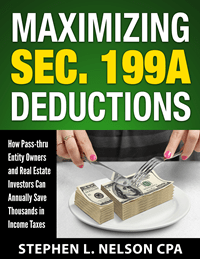A first version of some of the pages in 2018 IRS Publication 535 appeared a few days ago. (See here.) And conveniently the pages provide additional details concerning the Section 199A deduction.
Some of these details will surprise tax accountants, surely. Others may only exasperate.
But one interesting idea to ponder if you’ve followed closely the Section 199A discussion: Do the draft pages for Publication 535 reflect an evolution in Section 199A thinking on the part of the Treasury and IRS.
Maybe especially when you look at them in combination with the final regulations? I wonder. Several really significant details jump out from careful reading of the draft Publication 535 pages and a close look at the worksheets.
Trade or Business Requirement for Rental Investors Changes?
The proposed and final regulations for Section 199A said that real estate investors may calculate a Section 199A deduction for rental income if the investor shows regularity and continuity in her or his investing and is motivated by profit.
As I’ve discussed in my blog post, Section 199A Rental Property Trade or Business Definition, that set a fairly low bar and applied the Section 162 “trade or business” concept.
Publication 535 suggests a harsher rule, however, saying,
The ownership and rental of real property doesn’t, as a matter of law, constitute a trade or business, and the issue is ultimately one of fact in which the scope of your activities in connection with the property must be so extensive as to give rise to the stature of a trade or business.
The key thing that jumps out at me? That word, “extensive.”
Apparently, merely showing “regularity,” “continuity” and a “profit motive” means a taxpayer falls short?
Wow. Count me surprised. And by the way? The final regulations as well as the proposed rental property safe harbor also seem to suggest the IRS has tightened the eligibility rules for rental property investors. Darn!
Statutory Employees Get Clarity and a Win
More than one tax accountant wondered how Section 199A treats statutory employees. And, really, two specific questions popped up.
First, do the wages paid to statutory employees count as W-2 wages one can plug into the Section 199A formula? (My original guess was “no,” as discussed here: Section 199A Deduction Danger Zones.)
Second, do statutory employees who report their wages and any business expenses on a Schedule C form get to take the Section 199A?
Publication 535 answers these questions, saying you don’t count wages paid to statutory employees as wages. Further, it says statutory employees do get to calculate a Section 199A deduction on their Schedule C’s bottomline profit.
Okay, good to know… good to know. (Note that this accounting also meshes with what appears in the final regulations.)
Real Estate and Insurance Brokers and Agents Lose and Regain Deduction
Another interesting “real-estate-related” change that showed up in the draft pages for Publication 535… and then disappeared a few days later.
The first draft of the draft that appeared said real estate and insurance brokers and agents don’t get the Section 199A deduction.
That didn’t really make sense. The proposed regulations explicitly stated that real estate brokers and agents as well as insurance brokers and agents don’t count as specified service trades or businesses. But the first draft of the draft Publication 535 instructions said specified service trades or businesses include,
Brokerage services, including arranging transactions between a buyer and a seller for a commission or fee such as stock brokers, real estate agents and brokers, insurance agents and brokers, and intellectual property brokers;
Weirdly, a week or so later, the IRS changed the draft Publication instructions to say that specified service trades or businesses include,
Brokerage services, including services in which a person arranges transactions between a buyer and a seller with respect to securities for a commission or fee including services provided by stock brokers and other similar professionals, but not real estate agents and brokers, or insurance agents and brokers;
I mention this because the flip-flopping sowed a bit of confusion as well as wailing and gnashing of teeth.
Note: What I wrote here is correct and meshes with the second draft of the instructions as well as the final regulations: Real Estate Broker Section 199A Deductions.
“Principal Asset is Reputation or Skill” Label Expanded?
And another interesting change hinted at in the Pub 535 pages, maybe, is the way the Section 199A rules will be enforced by IRS auditors.
The Section 199A statute that Congress passed said any trade or business where the principal asset of the firm is the reputation or skill of one or more owners or employees counts as a specified service trade or business.
That matters… Why? Because then these businesses don’t generate qualified business income when the taxpayer’s income is high.
The proposed as well as the final regulations, elaborating on this issue, said the “principal asset” thing means a situation where some celebrity earns income from appearances, endorsements or licensing their image or name.
Curiously, the draft pages for Publication 535 say all these items do count but the pages also seem to describe them as examples of “principal asset” situations and not the complete list.
Specifically, the draft pages say a specified service trade or business is any,
…trade or business where the principal asset is the reputation or skill of one or more of its employees, including: – Receiving fees, compensation, or other income for endorsing products or services; – Licensing or receiving fees, compensation or other income for the use of an individual’s image, likeness, name, signature, voice, trademark, or any other symbols associated with the individual’s identity; or – Receiving fees, compensation, or other income from appearing at an event or on radio, television or another media format.
Am I maybe getting too sensitive to the choice of words the publication uses? Maybe… But have you ever argued with an IRS agent about this sort of language? Yeah, me too. And an agent will read something like that paragraph above from publication the way I worry.
Worksheets Clear Up Some Calculation Details
One riddle the draft Publication 535 pages didn’t clear up and didn’t provide help with: how adjustments for AGI work.

Specifically, lots of folks wondered whether things like the self-employed health insurance deduction, a sole proprietor’s or partner’s pension plan contributions, and maybe the self-employment taxes deduction counted as business deductions that reduce the qualified business income flowing out of a sole proprietorship or partnership.
The Pub 535 worksheets used to calculate the Section 199A deduction don’t include these deductions in their calculations which sort of seems to indicate that these items don’t reduce qualified business income.
However, this reading is wrong. According to the final regulations, things like a self-employed health insurance deduction, the employer share of self-employment taxes, and then employer-side pension contributions do reduce qualified business income and therefore the Section 199A. That confusion is lamentable.
One other interesting wrinkle to this? As of late January 2019, the tax software seems to be requiring tax accountants to make these sorts of calculations largely by hand. Yikes. This means the preparer needs to really understand the Section 199A regulations in order to handle returns with the Section 199A deduction.
An Awkward Final Comment
Most people aren’t ready for this new deduction as tax season begins. And by most people I mean the tax software providers, the tax accountants, the IRS personnel who will shortly be administering the new law, and then especially of course small business owners.
That bodes poorly for the coming tax season…

Good post. its very useful to all of us. Thanks for posting such a nice article. – it staffing company in bangalore
It appears that draft publication was pulled! I can’t seem to find it by searching IRS’s website (although your link still works). Perhaps there is further editing to be done.
The plot thickens.
You can see the draft at the IRS at
https://www.irs.gov/pub/irs-dft/p535–dft.pdf